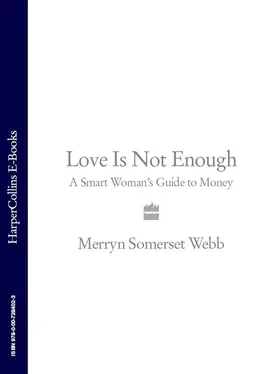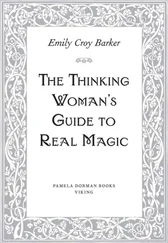You can do it
The good news is that you can both live well and prepare for the future, and much more easily than you think, as long as you are prepared to put a bit of work into it. There are two things to note here. First, the financial world is much simpler than the financial professionals would like you to think it is – this book explains everything you need to know to sort out a whole lifetime of money in three hundred straightforward pages. Second, and more importantly, there is little doubt that once they put their minds to it, women are just as good with money as men and in some ways often better.

There is evidence that women who do invest are better at it than men, for example: research from Digital Look shows that over more or less every time period, female investors have outperformed male investors. In 2003, for example, the average woman’s portfolio rose by 10% a year. The FTSE index (which measures the performance of the UK stock market as a whole) rose by 7% and the average man’s portfolio by 6%. And even in the year to the end of October 2002 when the FTSE fell by 22% the average female portfolio rose by 2%. So much for the idea that women are useless with money; in fact once we overcome our passivity and get started we are actually pretty good with it.
All this makes complete sense to me. Not everyone likes to admit it but in lots of ways the very nature of women makes us better suited to long-term money management. Thanks to social and biological roles as nurturers and carers, women are in general more cautious, patient and questioning than men. They don’t mind admitting ignorance and asking for things to be explained. They know that money doesn’t grow overnight and that investing and saving, like bringing up children, is a long-term job that requires substantial amounts of planning. And they know that when it comes to money the small things matter as much as the big things. All in all (and this is a huge generalization but not an unfair one), we have a much better temperament for dealing with money than many men. What we need is the knowledge and the will to take advantage of it and this is where we too often fall down.
Taking charge
I’ve been through a lot of the financial journey this book travels myself. I’ve been a student, I’ve done years of unpaid or underpaid work experience, I’ve had and left badly paid jobs in television and journalism as well as a few highly paid jobs in the City, I’ve worked full-time, part-time and freelance as well as in London and in Tokyo, I’ve participated in the setting up of a new business and most recently, in rather quicker succession than I initially intended, I’ve married and had a baby. I’ve been grossly financially irresponsible during a lot of this but I’ve also now managed to pull myself together and emerge in a relatively stable position.
A few years ago I realized that while I liked to think I had my finances under control, I simply didn’t. I had no pension arrangements and no plan in place for paying off my mortgage. I had various bits and bobs of savings but no real plan as to how they worked together. Then something happened to jolt me into action. I met my husband and he moved into my flat and took over half the mortgage. He was interested to see that it was an interest-only mortgage. How are you saving to pay it off at the end of the term? he asked. I confessed I wasn’t. He was horrified and I was embarrassed. But I was also prompted by his surprise, as well as his unwillingness to sort it all out for me (as he says, if he has to do half the housework, I can sort out my own bank accounts), to take charge of my own money. So I’ve sorted out my pension arrangements, I’ve started saving regularly and doing so in a tax-efficient way, I’ve switched the mortgage to the cheapest repayment mortgage I could find, I’ve reviewed my income and made sure it matches my skills and the work I put in, I’ve made sure we are paying the lowest possible prices for all our utilities and I’ve put a check on some (not all) of my unnecessary spending. It’s taken some time and been a reasonable amount of effort, but it feels very good indeed.
The point of this book is to show you that you too can use your natural skills to take control of your finances at every stage of your life. The first section looks at how to increase the amount of money you have every month. Your income is the most important factor when it comes to controlling your finances. Once you know that you are getting paid as much as you can for what you do you can settle down to working out how to turn that income into wealth. So the fact that most of us aren’t maximizing our incomes, aren’t paid what we are really worth, or as much as the man at the next desk, is a fundamental problem that we need to sort out as fast as we can. The section then considers spending (which isn’t all bad) and at debt (which also isn’t all bad).

The second section looks at how you can grow your assets – at saving, investing, pensions and property. Here we’ll go through the financial options on the market and explain which ones offer value and which ones are simply complicated vehicles invented by the financial industry to rip you off. I want to be the richest pensioner on my road when I retire and I want the same for you (as long as you live on a different road).
The next section considers what happens when you need to share your money. How will you pay for a wedding and how will you organize your finances within your marriage? How does the money work if you don’t marry but live with a long-term partner? What about children? How much will they cost and how will you pay for them to get what you want them to have? How can you possibly maintain your financial independence if you stop working to look after children? What are your legal rights as a working mother? And what if your marriage doesn’t work out? We look at how to deal with the financial shocks divorce throws at women.
Finally, in the last section we look at how money can make you happy – and how it can’t. Happiness isn’t all about money but financial clarity in your life will bring you a peace of mind that is hard to beat. I hope that by the time you get to the end of the book your finances will no longer be a source of blushes or stress but a source of that peace of mind.
Section 1:
Finding the Money
“Make your money and buy your freedom.”
Tamara Mellon, owner of Jimmy Choo
Конец ознакомительного фрагмента.
Текст предоставлен ООО «ЛитРес».
Прочитайте эту книгу целиком, купив полную легальную версию на ЛитРес.
Безопасно оплатить книгу можно банковской картой Visa, MasterCard, Maestro, со счета мобильного телефона, с платежного терминала, в салоне МТС или Связной, через PayPal, WebMoney, Яндекс.Деньги, QIWI Кошелек, бонусными картами или другим удобным Вам способом.













